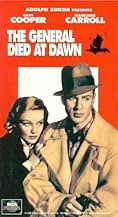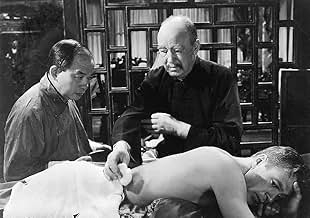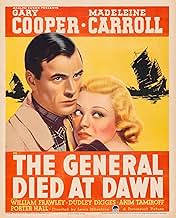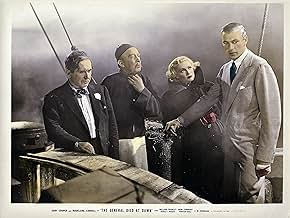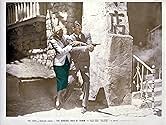VALUTAZIONE IMDb
6,4/10
1421
LA TUA VALUTAZIONE
Aggiungi una trama nella tua linguaAmid the anarchy of China, an American mercenary tangles with a ruthless warlord.Amid the anarchy of China, an American mercenary tangles with a ruthless warlord.Amid the anarchy of China, an American mercenary tangles with a ruthless warlord.
- Regia
- Sceneggiatura
- Star
- Candidato a 3 Oscar
- 1 vittoria e 3 candidature totali
Lee Tong Foo
- Mr. Chen
- (as Lee Tung-Foo)
Hans Fuerberg
- Yang's Military Advisor
- (as Hans Furberg)
Irene Bennett
- Passenger
- (non citato nei titoli originali)
Spencer Chan
- Killer
- (non citato nei titoli originali)
Thomas Chan
- Houseboy
- (non citato nei titoli originali)
Recensioni in evidenza
Did you ever come in late to a movie and miss the beginning? You have to try hard to concentrate and catch up, all the while feeling off-balance and wondering how much you missed. That's the way this picture starts off, and I spent some time trying to 'fit in' to the plot. But this film's plot moves at break-neck speed and made me think it is an editing flaw.
Having recovered, I found the story completely original and refreshing (can't think of too many Chinese Civil War flicks!). I also found a lack of tension - what's the opposite of nerve-wracking? - as there is no sense of urgency to the proceedings. The principals were just fine; Gary Cooper, Madeleine Carroll and Akim Tamiroff, and special mention must be made of Philip Ahn, who was the personification of evil Japanese military in many WWII pictures.
It is worth viewing but is a minor entry in the Gary Cooper canon. I liked it and recommend it but I plan to watch it again soon because I think it is one of those pictures in which some subtlety is overlooked in only one viewing.
Having recovered, I found the story completely original and refreshing (can't think of too many Chinese Civil War flicks!). I also found a lack of tension - what's the opposite of nerve-wracking? - as there is no sense of urgency to the proceedings. The principals were just fine; Gary Cooper, Madeleine Carroll and Akim Tamiroff, and special mention must be made of Philip Ahn, who was the personification of evil Japanese military in many WWII pictures.
It is worth viewing but is a minor entry in the Gary Cooper canon. I liked it and recommend it but I plan to watch it again soon because I think it is one of those pictures in which some subtlety is overlooked in only one viewing.
I was surprised at the low rating for this film at IMDb, 6.7 as of this writing. I found it a very enjoyable film. I'm a sucker for strong, moody visuals, and this film sure has them. In fact, about half way through I began to wonder, with all the shadows and fishing nets, if this were a Von Sternberg film. The script, which some reviewers found too wordy or too preachy, I found very engaging. The pacing was excellent.
Some reviewers have taken offense at the two main Chinese characters being played by occidentals who spoke pigeon English. Well, that's how films were made back then. Sure it seems unfair to modern viewers. It was unfair. Is that reason to trash the whole film? The Asian actors who had speaking roles came across as intelligent and well spoken.
If you're in the mood for some dark, exotic espionage, I definitely recommend this.
Some reviewers have taken offense at the two main Chinese characters being played by occidentals who spoke pigeon English. Well, that's how films were made back then. Sure it seems unfair to modern viewers. It was unfair. Is that reason to trash the whole film? The Asian actors who had speaking roles came across as intelligent and well spoken.
If you're in the mood for some dark, exotic espionage, I definitely recommend this.
Lewis Milestone is surely one of the most under-appreciated directors from Hollywood's Golden Era. He may be the best example to illustrate how cinematographers and film editors have less to do with how good a movie looks than the director himself. Lewis Milestone's pictures exhibit the same fluid, sensuous, exhilarating black and white cinematography and silky smooth scene changes no matter who his camera man and editor were. The fluid movement of his camera was his trade mark and an innovative style much copied, especially in the 'forties. He is in fact credited with the invention of the camera dolly while filming the early talkie classic All Quiet On The Western Front (1930).
In The General Died At Dawn the gorgeous cinematography finds a worthy subject of concentration in the breath-taking beauty of leading lady Madeleine Carroll, who plays a tormented femme fa-tale, manipulated into wicked and even murderous money-making schemes by her terminally ill and morally challenged father (Porter Hall). When she has to lure idealistic soldier of fortune Gary Cooper into the clutches of cruel, tyrannical Chinese warlord Akim Tamiroff, she quite naturally falls in love with him -- Cooper, not Tamiroff, of course! Miss Carol has never looked lovelier than in this picture. As she reached thirty years of age, a dawning maturity was adding character to her beauty and endowing her gorgeous face with an aching sensuality. Okay, trying to describe what makes a beautiful woman that way is like trying to describe what makes Oreo cookies taste so good. Believe me, Madeleine had it! Not to mention, she was a terrific actress!
When Gary Cooper is on screen, he doesn't have to worry about anyone stealing attention, even a beaut like Madeline Carroll. Tamiroff, who earned an Accademy Award nomination for his role, is bizarrely riveting, as he was in nearly every movie appearance. Good support is also provided by Hall in one of his best performances, Dudley Digges, and William Frawley. Frawley is rather irritating, as in all his roles, but it was intended here.
The plot is confusing at times, and doesn't always make complete sense, but it wasn't so difficult to keep up with as others have carried on. Compared to, say, The Big Sleep (1946), it was as easy to follow as The Three Little Pigs. Whatever the story, Milestone knew how to reel it out in a way that would keep your peepers glued to the screen. This style of suspenseful story-telling immersed in eye-grabbing cinematography would be honed to a fine edge in the next decade with his masterpieces Edge Of Darkness (1943) (see my review) and The Strange Loves of Martha Ivers (1946). In fact this 1936 movie's flowing camera work, oblique angles, frequent night scenes, and dark, brutal story seem to be pointing the way to the stylish noir thrillers of the next decade.
The General Died At Dawn has everything you could ask from a movie -- top stars, exciting action, gorgeous cinematography. Top-notch Old Hollywood entertainment from the smoothest of the smooth, Lewis Milestone!
In The General Died At Dawn the gorgeous cinematography finds a worthy subject of concentration in the breath-taking beauty of leading lady Madeleine Carroll, who plays a tormented femme fa-tale, manipulated into wicked and even murderous money-making schemes by her terminally ill and morally challenged father (Porter Hall). When she has to lure idealistic soldier of fortune Gary Cooper into the clutches of cruel, tyrannical Chinese warlord Akim Tamiroff, she quite naturally falls in love with him -- Cooper, not Tamiroff, of course! Miss Carol has never looked lovelier than in this picture. As she reached thirty years of age, a dawning maturity was adding character to her beauty and endowing her gorgeous face with an aching sensuality. Okay, trying to describe what makes a beautiful woman that way is like trying to describe what makes Oreo cookies taste so good. Believe me, Madeleine had it! Not to mention, she was a terrific actress!
When Gary Cooper is on screen, he doesn't have to worry about anyone stealing attention, even a beaut like Madeline Carroll. Tamiroff, who earned an Accademy Award nomination for his role, is bizarrely riveting, as he was in nearly every movie appearance. Good support is also provided by Hall in one of his best performances, Dudley Digges, and William Frawley. Frawley is rather irritating, as in all his roles, but it was intended here.
The plot is confusing at times, and doesn't always make complete sense, but it wasn't so difficult to keep up with as others have carried on. Compared to, say, The Big Sleep (1946), it was as easy to follow as The Three Little Pigs. Whatever the story, Milestone knew how to reel it out in a way that would keep your peepers glued to the screen. This style of suspenseful story-telling immersed in eye-grabbing cinematography would be honed to a fine edge in the next decade with his masterpieces Edge Of Darkness (1943) (see my review) and The Strange Loves of Martha Ivers (1946). In fact this 1936 movie's flowing camera work, oblique angles, frequent night scenes, and dark, brutal story seem to be pointing the way to the stylish noir thrillers of the next decade.
The General Died At Dawn has everything you could ask from a movie -- top stars, exciting action, gorgeous cinematography. Top-notch Old Hollywood entertainment from the smoothest of the smooth, Lewis Milestone!
As Universal states, in their nicely packaged DVD set entitled "The Gary Cooper Collection" (2005), the celebrated actor is "a mysterious American soldier of fortune determined to foil the ambition of a ruthless enemy general planning to take over the provinces of Northern China. Exotic settings, captivating performances, and extraordinary cinematography power this thrilling tale of courage in the line of fire."
The story isn't as substantive or engaging as the presentation, but quality certainly permeates the production. "The General Died at Dawn" helped Mr. Cooper become Quigley Publications' "World Box Office" male star of 1936. In beautiful form, Madeleine Carroll (as Judy Perrie) certainly helped. Of five "Best Supporting Actor" possibles, Akim Tamiroff (as General Yang) received the "Oscar" nomination.
****** The General Died at Dawn (9/2/36) Lewis Milestone ~ Gary Cooper, Madeleine Carroll, Akim Tamiroff, William Frawley
The story isn't as substantive or engaging as the presentation, but quality certainly permeates the production. "The General Died at Dawn" helped Mr. Cooper become Quigley Publications' "World Box Office" male star of 1936. In beautiful form, Madeleine Carroll (as Judy Perrie) certainly helped. Of five "Best Supporting Actor" possibles, Akim Tamiroff (as General Yang) received the "Oscar" nomination.
****** The General Died at Dawn (9/2/36) Lewis Milestone ~ Gary Cooper, Madeleine Carroll, Akim Tamiroff, William Frawley
"The General Died at Dawn" features Gary Cooper in a role similar to the one he played in "For Whom the Bell Tolls" a couple of years later. Directed by Lewis Milestone the movie is visually stunning and exciting. Madeleine Carroll (fresh from her success in Hitchcock's "The 39 Steps")is very good as Cooper's love interest.Akim Tamiroff was nominated for an Oscar as the General.He's certainly a menacing figure here.But I think Philip Ahn as his second in command delivers the best performance.What subtle fanaticism he conveys.The movie is full of interesting twists in the storyline and except for the ending,which I found a bit silly,it is a solid movie.
Lo sapevi?
- QuizThe main character, O'Hara, is based on the real-life adventurer Morris "Two-Gun" Cohen (1887-1970). Born in Poland to a Jewish family, Cohen grew up in the tough streets of London's East End. As a teenager, he moved to western Canada and became a ranch hand and gambler in Saskatchewan, and later a highly successful real-estate agent in Alberta. During World War I he fought in Europe with the Canadian Railway Troops. His friendship with Chinese workers on the Canadian-Pacific Railroad prompted him to go to China in the 1920s. After negotiating a railroad deal with Dr. Yat-sen Sun, Cohen became a personal bodyguard to Sun and a trainer of Sun's private army. After Sun's death in 1925, Cohen ran guns for various Chinese warlords throughout the 1930s. When the Japanese invaded China in 1937, Cohen continued to supply Chinese resistance forces with arms and served with the British SOE. In 1941, following the fall of Hong Kong, he was captured by the Japanese and put in a prison camp, but was traded to the English in 1943 in a rare prisoner exchange. After the war, Cohen continued to operate in China as an agent for various British firms, including Rolls-Royce and Decca Radar. His former dealings with Chinese warlords kept him in good standing with Chinese Communist officials until his death in 1970.
- BlooperWhile arguing with Peter, Judy slams a book down on the desk. A couple of other books on the corner of the desk disappear in a later scene.
- Curiosità sui creditiThe opening credits all appear on the sails of boats.
- ConnessioniFeatured in Red Hollywood (1996)
I più visti
Accedi per valutare e creare un elenco di titoli salvati per ottenere consigli personalizzati
- How long is The General Died at Dawn?Powered by Alexa
Dettagli
- Data di uscita
- Paese di origine
- Lingua
- Celebre anche come
- The General Died at Dawn
- Luoghi delle riprese
- Azienda produttrice
- Vedi altri crediti dell’azienda su IMDbPro
- Tempo di esecuzione1 ora 38 minuti
- Colore
- Proporzioni
- 1.37 : 1
Contribuisci a questa pagina
Suggerisci una modifica o aggiungi i contenuti mancanti

